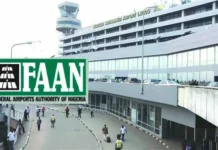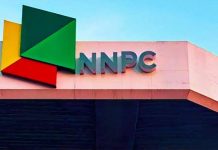🌿 Ruzu Non-Alcoholic Herbal Bitters
Ruzu Non-Alcoholic Herbal Bitters is a natural health supplement specially formulated to:
- ✅ Promote general wellness
- ✅ Detoxify the body
- ✅ Support the treatment of various ailments
Made from a powerful blend of 100% organic and medicinal herbs, Ruzu is completely alcohol-free, making it ideal for:
- 👪 All age groups
- 🌱 Health-conscious individuals
- 🌿 Anyone seeking non-alcoholic herbal remedies
Whether you're looking to boost your vitality, cleanse your system, or support healing the natural way, Ruzu Bitters offers a trusted herbal solution.
Nigeria’s mortgage system is being undermined by rampant corruption in the housing and financial sectors, making homeownership increasingly unachievable for many individuals, according to a warning from the Nigerian Institute of Quantity Surveyors.
In light of this, Azeez Ayodabo, General Secretary of the Nigerian Institute of Quantity Surveyors, has called on the Federal Government to examine its mortgage system rules.
In honor of the Nigerian Institute of Quantity Surveyors’ golden jubilee celebration, he made this request during a news conference held at the Lagos Chapter.
“The government should review its policies to make mortgage access more flexible,” he stated. Income categories should be taken into account while adjusting thresholds. Mortgage loans ought to be available to people according to their income. The government shouldn’t, for example, promote a three-bedroom maisonette and expect a level six or level seven civil servant to purchase it. It’s not realistic. Bungalows, apartments, terraces, and duplexes should all be included in housing designs so that residents can select the option that best suits their budget. In this manner, everyone benefits, not just the wealthy. Lack of information is another problem. Depending on the applicant’s age and income, the Federal Mortgage Bank of Nigeria offers long-term mortgage windows of up to 30 years; however, this information is not generally accessible. Furthermore, the mortgage system has been severely damaged by corruption. Many people obtain loans intended for the general public by taking use of official ties.
Indeed, the mortgage system has been undermined by corruption. For example, developers who received government housing loans were required to construct and sell three-bedroom bungalows for N7.5 million between 2006 and 2009. Even after subscribers began making payments through mortgage deductions from their salaries, many instead misappropriated the money and neglected to deliver the residences. Because of this, the government was forced to discontinue that system and assume direct supervision over mortgage applications. Therefore, citizens have a part to play and the government is not only to blame.
We argue that hiring quantity surveyors is necessary when it comes to affordability. One of the most common mistakes committed nowadays is hiring QSs for a portion of a project, solely to prepare the Bill of Quantities, and then excluding them later. This results in waste and a lack of cost control. In order to guarantee quality and stop corner-cutting, the QS is essential. For example, a quantity surveyor on site can detect it through valuation and documentation checks if the contractor replaces the required 16 mm reinforcement with a lower grade. This guarantees project integrity and establishes responsibility. The quantity surveyor has a broad and vital responsibility. Therefore, we implore the public and the government to identify and involve the appropriate specialists in their proper roles.
Rilwan Balogun, the chapter chairman, discussed the value of quantity surveyors and pointed out that they needed to be more deeply involved, particularly in infrastructure.
growth.
“Too often, their expertise is limited to building projects, while vast opportunities exist in heavy engineering, civil engineering, oil and gas, and other major infrastructure sectors,” he clarified. The call to action is for broader inclusion since government and private clients can assure economic efficiency, promote transparency, and obtain better value for their money by forming consortiums.
“The Renewed Hope Agenda of the current government aims to reorient the economy, but without the technical and financial rigor that QS consortiums provide, this goal cannot be realized. Early QS participation is crucial from design to execution, as seen by the debate surrounding projects like the Lagos–Calabar Coastal Highway. Consortiums could have prevented problems with exorbitant expenditures and a lack of transparency if they had been involved from the beginning. The crucial checks and balances that guarantee cost control and accountability are gone when engineers plan, estimate, and carry out the work alone.
The continuous argument between the Bill of Quantities and the Bill of Mechanical and Electrical also reflects this imbalance. Instead of the BME, which is solely utilized in Nigeria, the BOQ, which is created by the quantity surveyor or cost engineer, is the internationally recognized document. In contrast to BMEs, which frequently lack depth and clarity, a well produced BOQ is thorough, transparent, and extensive, detailing every nail, bolt, and reinforcement required for construction. BME papers can result in significant differences and waste, but the BOQ guarantees accuracy and restricts cost deviation to roughly 5%. Therefore, it is important to emphasize that the fundamental duties of a quantity surveyor are cost estimation, appraisal, and control.
The idea that quantity surveyors have no part in the problem of building collapse is false. By outlining material specifications and workmanship standards within the BOQ, QSs really serve a preventive function. Unfortunately, in an effort to save money, contractors or clients occasionally get around these requirements by utilizing inferior materials or fewer reinforcements, which eventually compromises structural integrity. As a result, the government ought to require BOQ submission as a requirement of construction approval procedures. This would lessen the number of abandoned or subpar building projects by enabling authorities to evaluate both the project’s cost and the developer’s financial ability to carry it out. QSs’ essential role in guaranteeing quality and safety in the built environment is further confirmed by their membership in the Building Collapse Prevention Guild.
The Deputy Chairman, Femi Falusi, pointed out that the difficulties became more complicated with the introduction of technology.
“As my chairman correctly noted, many allied professionals now believe they can perform the work of QSs due to the advancement of technology,” he stated. As a result, our professional space is being widely invaded. Now that QS software is available, some non-QSs utilize it to create bills of quantities and try to estimate costs. Because there are now more professionals and outsiders vying for fewer open positions, competition has increased.
“We are pushing for more robust policy measures to address this. We hope to change government policy through programs like the DLA so that all bills of quantities or cost estimates submitted for building clearance are required to be completed and stamped by a registered quantity surveyor. Enforcing such a policy will assist prevent professional invasion and guarantee responsibility.
Finally, we acknowledge that technology is here to stay as we look to the future. It presents obstacles as well as opportunities. In order to improve their professional competence and stay relevant in this changing business, we at the chapter level continue to push our members to upskill, embrace innovation, and utilize digital tools.
















